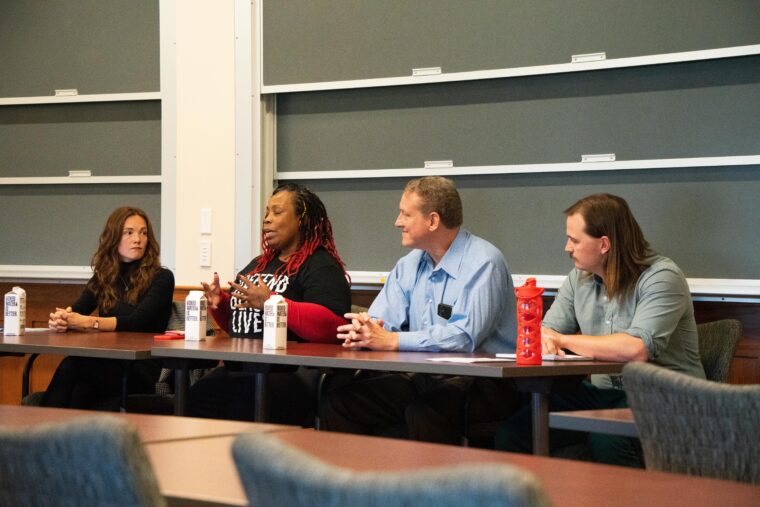News
Prison Education Project holds panel discussion on mass incarceration and public health

Panelists discuss mass incarceration (Cami Vynerib | Student Life)
The Washington University Prison Education Project (PEP) held a panel discussion on the public health crisis posed by mass incarceration in Missouri and the United States on Oct. 16.
PEP was established by the University in 2014 and offers college degrees to inmates in two Missouri Prisons. It graduated its first class in 2019.
The event, which focused on the growing public health crisis in prisons, was part of the Gephardt Institute’s Civic Action Week and featured three panelists: George Putney, PEP Alumni and current student in the Brown School, ML Smith, Founder and Director of the Missouri Justice Coalition and Co-Director of Missourians to Abolish the Death Penalty, and Ella Siegrist, a PEP Instructor and PhD student at the University.
In Missouri prisons, access to healthcare is a major issue and, tied with an aging inmate population, death in prison has become a pervasive issue.
“From the first of this year to October 11th, 105 people have died in Missouri [Department of Corrections] (DOC),” Smith said.
During his time as an inmate, Putney saw first hand the disparities in prison healthcare.
“I spent the majority of my time at [Missouri Eastern Correctional Center] (MECC). You had one doctor, you had one psychologist, you had a minimal amount of nurses at any given time,” Putney said.
Siegrist, whose research focuses on reproductive healthcare in prison, added that one of the most fundamental issues facing inmates is access to care and the influence reproductive care received, or the lack thereof, as an inmate can affect people’s lives.
“It really shapes people’s reproductive health trajectory and also their access to social services,” Siegrist said.
She further noted that the privatization of prison healthcare has further reduced access for inmates to expensive and potentially life saving treatments.
“The majority of jails and prisons now have privately provided health care services, which means that someone has an economic incentive…to reduce the number of expensive procedures that are happening,” said Seigrist.
She said that The Prison Litigation Reform Act has created hurdles for inmates seeking legal recourse for complaints, including healthcare related complaints. Before being heard by a court, an inmate must go through an administrative process to confirm the legitimacy of their complaint.
Prison healthcare providers are held to a significantly lower standard than hospitals, and some healthcare professionals find themselves working in prisons as a last professional alternative.
During the Covid-19 Pandemic, the disparities in prison healthcare became apparent. Missouri was one of thirteen states not to institute a compassionate release program, a program hastening the release of non-violent offenders and those eligible for medical parole.
Today, according to Smith, over 400 inmates in Missouri Prisons are over 70 years old. As the inmate population ages, diseases such as ulcerative colitis become more prevalent, increasing the need for expensive healthcare.
“My cellmate had ulcerative colitis, and they just sent him to Potosi which was a level five [prison] but had an Infirmary until they can get the symptoms under control,” Putney said. “They did not give him the medication he really needed because it was very expensive.”
While the majority of the conversation focused on state and federal prisons, there was discussion of the role that local jails play in inmates’ healthcare journeys.
Unlike prisons, jails, which primarily detain either individuals awaiting trial or inmates serving shorter sentences, see higher turnover rates of inmates, posing a unique opportunity for medical professionals.
“It could be a place where people who have been kind of symptomatic medically locked out of access to health care health insurance, could be receiving care, and could be screened for certain things,” Siegrist said.
In St. Louis, there have been complaints of inadequate access to medical care among other issues at the St. Louis City Justice Center. However, as Smith notes, these issues are not limited just to urban areas.
“Nobody in Missouri has went [sic] to rural Missouri with these issues,” Smith said.
Both Smith and Seigrist cited grassroots activism as one of the ways anyone, including students, can get involved with this issue.
“Definitely following the policies and supporting local bills,” Seigrist said. “You can do research and look into these issues, both locally and nationally, and amplify them.”
Smith noted that students can also get involved by attending protests, writing letters to officials, and being informed about local, state, and national issues.
“Any way that you can support and help the actual movement, the grassroots movement, to deal with these issues is very needed,” Smith said.
